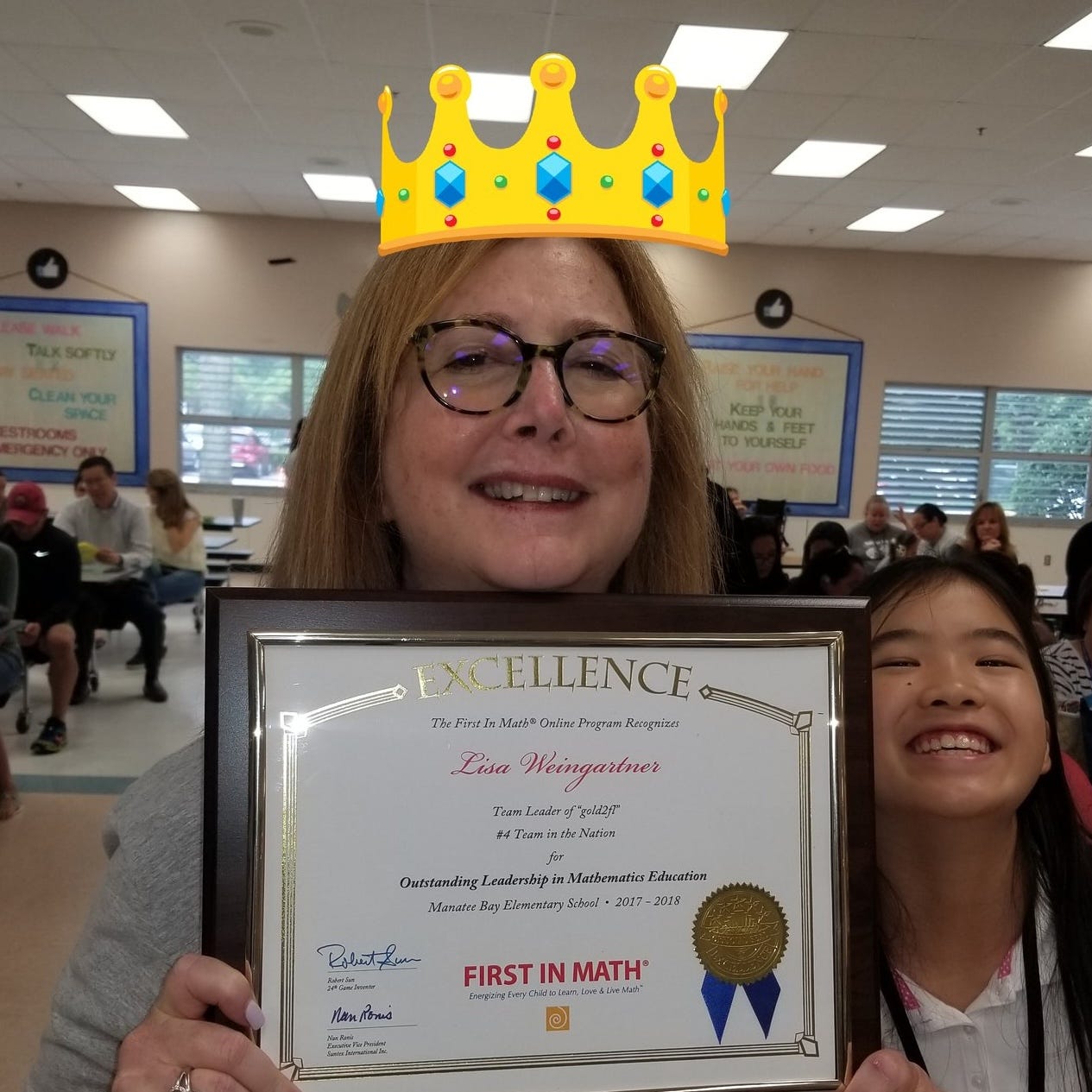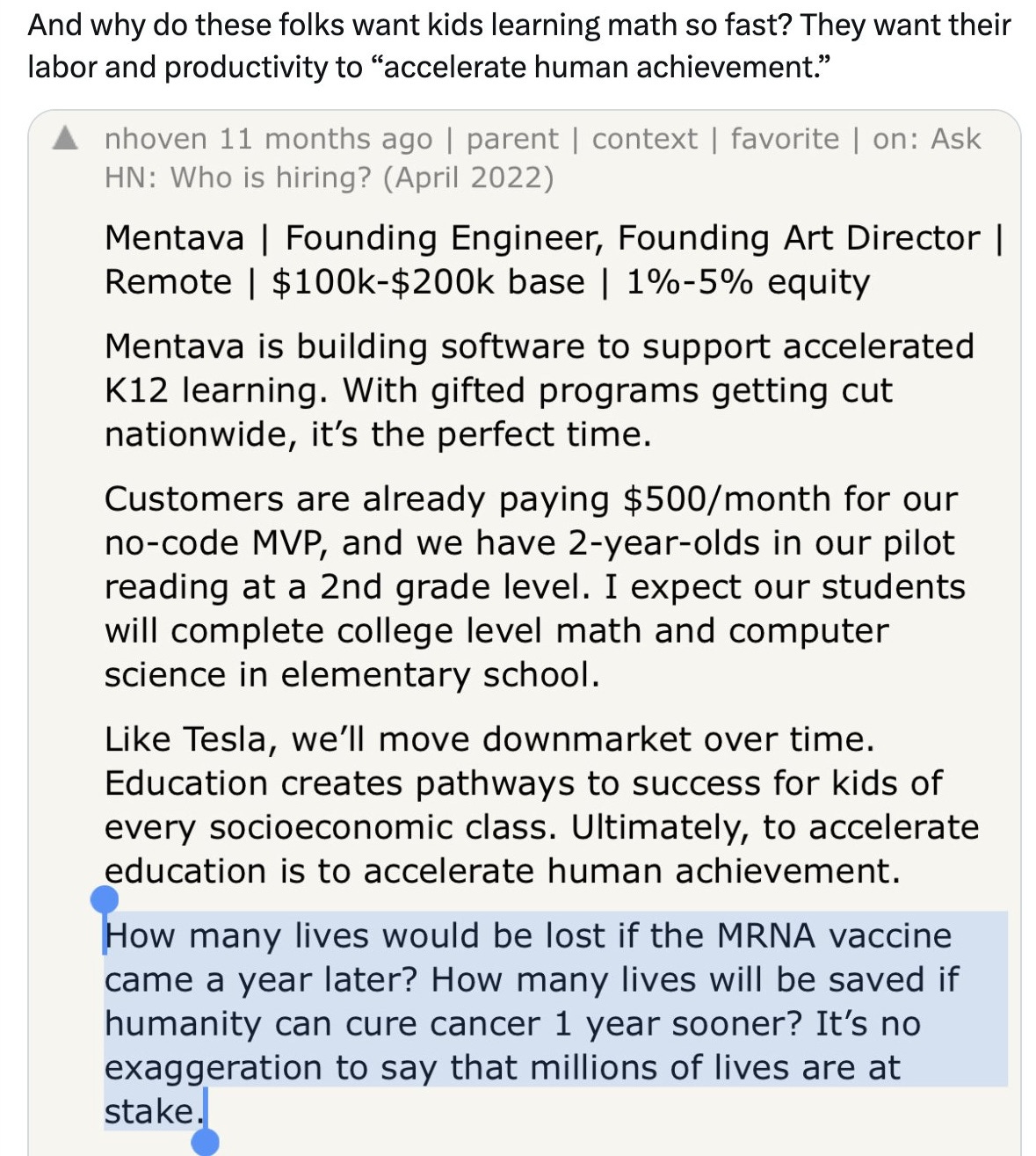I came to the US from Peru halfway through fourth grade. My English was not so good. Okay, it was terrible – I ended up with a D, taking remedial classes. A snippet from that year: we had learned about volcanic rocks, igneous, sedimentary, metamorphic. It came up on the test, “the three types of rocks are: _____, _____, and _____.” So I wrote, “sedimentary, metamorphic, and igneous.” Wrong, wrong, wrong. They were supposed to be in the right order! For the first time, I started to struggle in math class. I didn’t get division, and started to believe I wouldn’t get division. My dad found out, and with an hour of practice it turns out I didn’t have a congenital inability to perform division.
The FCAT, administered in Florida to every student at the end of every year, bailed me out. There was some automatic threshold for that test that qualified you for gifted classes in fifth grade. The next year was totally different. I am grateful to my teacher that year, Lisa Weingartner. She retired recently — Mrs. Weingartner, if you come across this post, thank you!!!
Excellent teachers like Mrs. Weingartner aside, our approach to education is broken, especially for smart kids. I’ve seen people take the attitude that gifted kids will be fine so we shouldn’t worry about teaching them. Let’s focus on the rest of the class.
Look, I get where that comes from. If you’re Miami-Dade county, you have to figure out how to manage 300,000 students in 500 schools. Each school has to manage 600 kids (division!). When you’re faced with that kind of logistical challenge you simply have to make trade-offs, and it feels cruel to take resources away from kids who are struggling.
But the result of this approach is that many of the kids with the highest potential, the greatest ability to some day make a contribution that affects all of our lives positively, have their growth stunted. In the end we all pay the price for that.
A couple months ago, there was a Twitter dust-up about related to this. A reporter started criticizing a startup building software to teach kids how to read.
At least on my corner of this internet, this backfired, and made the startup more famous (a sort of Streisand effect).
Since this happened I’ve been following Mentava and its founder, Niels Hoven.
Mentava’s customers seem pretty happy. “Within the first week of using Mentava, my three year old read his first words! It was incredible to witness.” “It’s more effective than the in person tutor we were paying for.” “he asks for his ‘reading 'pad’ at least twice a day, then cheers as if we’ve just given him candy.”
These don’t look like exploited kids to me.
Why do we punish people for trying? We should hold products like Mentava to high standards; it’s important to punish snake-oil salesmen. But cynicism and defeatism accomplish nothing. They result in the attitude, “education is too important/vital to entrust to tech.” What is this supposed to mean? We should not try to use technology to improve education? Only the government can educate children?
Computers have given us leverage in many aspects of our lives, but to date, software has been too rigid to be an effective teacher. Schools are still stretched thin and rely on ineffective strategies. Academics sit around seriously asking, “does it matter if kids read the books they have at home?” The status quo is for schools waste kids’ time; how much of your fifth grade Spanish class do you remember? Should it be normal to retain so little of what you learn?
Worse, the alternative for many kids is not even a mediocre learning environment, but vapid video content like Cocomelon (176 million subscribers on YouTube) and AI-generated knockoffs that don’t even pretend to try — kids are developing the habit of mindlessly consuming video for hours a day. In time they graduate to social media and Netflix, which claims sleep is its biggest competition.
Startups like Mentava that are genuinely trying to create engaging, personalized learning experiences deserve our support and encouragement, not knee-jerk dismissal. We are on the precipice of great tutors for everyone. Mentava is taking the first step, and I’m cheering them on.
I’m on the side of accelerating human achievement. 🚀
P.S. Niels, if you come across this post, thanks for building something awesome. Pretty please let me invest :).
P.P.S. Thank you to Niels for constructive feedback on this essay!



